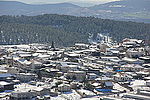Qaddita
Arab villages depopulated prior to the 1948 Arab–Israeli WarDistrict of SafadPages with non-numeric formatnum arguments

Qaddita (Arabic: قدّيتا, transliteration: Qaddîtâ) was a Palestinian Arab village of 240, located 4.5 kilometers (2.8 mi) northwest of Safad. It was captured and depopulated in the 1948 Arab-Israeli War, with some of its inhabitants expelled or fleeing to nearby 'Akbara where they live as internally displaced Palestinians and others to refugee camps in Lebanon or Syria.
Excerpt from the Wikipedia article Qaddita (License: CC BY-SA 3.0, Authors, Images).Qaddita
שביל דו-קיום דלתון-גוש חלב (ג'יש), Merom HaGalil Regional Council
Geographical coordinates (GPS) Address Nearby Places Show on map
Geographical coordinates (GPS)
| Latitude | Longitude |
|---|---|
| N 33.004722222222 ° | E 35.468055555556 ° |
Address
שביל דו-קיום דלתון-גוש חלב (ג'יש)
Merom HaGalil Regional Council
North District, Israel
Open on Google Maps









